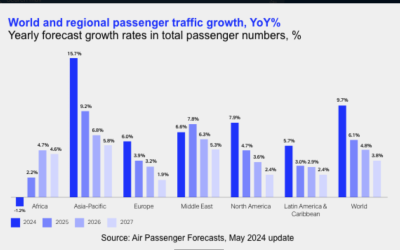linkedin.com/in/shadrachswantekambai
Fostering Growth, Innovation, and Sustainability in Airline Operations

In a dynamic and competitive aviation industry, strategic planning plays a pivotal role in the success and sustainability of commercial airlines. Strategic planning is crucial for commercial airlines in Nigeria to navigate the dynamic aviation industry. It helps in setting clear objectives, identifying competitive advantages, optimizing resource allocation, and mitigating risks. Effective strategic planning enables airlines to adapt to market trends, enhance operational efficiency, and ensure long-term sustainability in a highly competitive and volatile sector. This is particularly true for Nigeria, a country with a growing air travel market and significant potential for economic development. In this article, we will explore the key elements of strategic planning that are essential for commercial airlines in Nigeria to thrive.
Market Analysis and Customer Segmentation
Effective strategic planning begins with a comprehensive analysis of the Nigerian market. Airlines must identify and understand customer needs, preferences, and behaviors to tailor their services accordingly. Segmenting the market based on factors like business travelers, leisure travelers, and regional demands enables airlines to target specific customer segments and design competitive offerings.
Fleet Optimization and Route Planning
Optimizing the airline’s fleet and route network is crucial for cost efficiency and customer satisfaction. Airlines should evaluate their aircraft selection, considering factors such as fuel efficiency, capacity, and maintenance costs. Strategic route planning should focus on high-demand destinations, connecting major cities and catering to emerging regional markets.
Partnerships and Alliances
Collaboration and strategic partnerships with other airlines, both domestic and international, can create synergies, expand route networks, and enhance operational capabilities. Joint ventures, codeshare agreements, and frequent flyer program alliances can improve connectivity, increase customer loyalty, and open up new revenue streams.
Technology and Innovation
Embracing technological advancements and innovation is essential for airlines in Nigeria to stay competitive. This includes investing in modern reservation systems, online booking platforms, and mobile applications to enhance customer experience and streamline operations. Adopting fuel-efficient aircraft, implementing advanced maintenance and safety systems, and utilizing data analytics for decision-making can significantly impact operational efficiency and profitability.
Regulatory Compliance and Safety
Strategic planning must prioritize compliance with aviation regulations and industry safety standards. Airlines need to establish robust safety management systems, train their staff effectively, and regularly monitor and improve safety protocols. Compliance with regulatory requirements not only ensures passenger trust but also protects the airline’s reputation and minimizes risks.
Talent Management and Employee Development
Airlines should develop a strategic approach to talent management, focusing on attracting, retaining, and developing skilled professionals. Investments in training programs, career advancement opportunities, and employee engagement initiatives contribute to a motivated workforce, resulting in improved customer service, operational efficiency, and overall success.
Conclusion
Strategic planning is a fundamental component of commercial airlines’ success in Nigeria’s aviation industry. By conducting market analysis, optimizing fleets and routes, forming strategic alliances, embracing technology, prioritizing safety, and nurturing talent, airlines can navigate the challenges and seize opportunities for growth and profitability. With a well-executed strategic plan, Nigerian airlines can soar to new heights, contributing to the country’s economic development and positioning themselves as key players in the global aviation landscape.
- How Nigerian Banks Can Leverage IDERA to Revitalize the Airline Industry
- Aircraft Leasing and the Role of IDERA in Nigeria’s Airline Industry
- Managing Stress and Fatigue: A Shared Responsibility
- Aviation Industry: A Call for Integrity and Intentional Change
- Nigeria Lost the USA FAA Category One Rating: #Implications



0 Comments